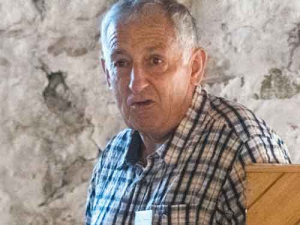Prepare now for M. bovis failure – Woodford
Agribusiness expert Keith Woodford is warning that the chances of eradicating Mycoplasma bovis are not high.
 Keith Woodford believes public sentiment won’t allow current dairy practices to continue for the next 20-30 years.
Keith Woodford believes public sentiment won’t allow current dairy practices to continue for the next 20-30 years.
Agribusiness consultant Keith Woodford is a big fan of composting dairy barns.
Speaking at the recent Centre for Dairy Excellence Dairy Barns conference in Timaru, Woodford said dairy farmers are going to have to do “something” to get cows off pasture in late autumn and winter.
He says the New Zealand community will not allow current dairy practices to continue for the next 20 to 30 years.
Woodford says there are various types of dairy barns and no one answer for all.
“I am enthusiastic about composting barns and the solutions they can to provide in NZ. But they are not the only solution, of course.”
Woodford found one composting barn that is working well in NZ, but says there could be three others and “a couple of hundred” in the US.
Woodford identified four basic barn farming systems: 24/7 indoor farming with year-round milking and fully cut-and-carry feeding; indoor-outdoor hybrid with year-round milking; indoor-outdoor with seasonal milking; and off-paddock shelter used only for limited periods of bad weather in a seasonal milking operation.
He also identified four basic barn types: composting; freestall barns with separate standing areas and individual bedding stalls; non-composting loafing barns; and slatted-floor barns with effluent bunkers underneath.
On his analysis, only composting barns tick all the boxes as suitable and economic for all four farming systems.
A fully composting barn has large areas of composting material at least 600mm deep where the cows spend virtually all their time.
“It will have roof venting and it will have daily tilling. If those things aren’t occurring it is not going to be a composting barn.”
Woodford says the compost should stay in for 12 months. If it has to be pulled out sooner because it is turning into a foul-smelling “anaerobic custard” then the farmer is doing something wrong.
“It’s got to smell nice. It’s got to be pretty dry. If you can squeeze water out of it that ain’t compost,” he explained. “There’ll be steam everywhere as you till, because evaporation is where the moisture goes.”
There must be some form of waterproof sealing under the 600mm compost, with a drainage system to catch any effluent, although in a properly functioning composting barn nothing will come out.
“All your moisture is going up through the system to the sky. But it won’t work without the right structure -- a decent-shaped roof of at least 18 degrees slope. You’ve got to have internal venting up top and daily tilling.”
The compost is tilled by a tractor twice a day, usually when the cows are out being milked. However, tilling also works with robot milking systems in which the cows do not leave the barn.
“That’s OK. The cows will get up and get out of the way as you do it. I’ve seen that happening in North America,” Woodford says.
He says the benefits of composting barns include cow comfort, clean udders, less lameness compared to freestall, and no liquid waste.
He says barns may also mitigate nitrogen leaching and greenhouse gas emissions, although this needs quantification. Added that this should come improved biological efficiency, as measured by the ratio of milk produced per kilo of bodyweight.
Woodford concedes that a composting system will not be for everyone; it requires matching the barn structure to the farming system. He warns that systems could change over time and there is no simple answer as to whether it is the structure or the system that comes first.
“This is going to have a role for us in NZ. We are going to have to do something to get cows off-paddock in the second half of autumn and winter.”
The Meat Industry Association of New Zealand (MIA) today announced that Chief Executive Officer Sirma Karapeeva has resigned from the role.
The winners of the 2026 Hawke’s Bay/Wairarapa Dairy Industry Awards were announced at the annual awards dinner held at Copthorne Solway Park in Masterton on Thursday evening.
Environment Southland is welcoming this week’s decision by the Environmental Protection Authority (EPA) to approve the release of Blaptea elguetai, a leaf‑feeding beetle that will help control the highly invasive Chilean flame creeper.
This March, the potato industry is proudly celebrating International Women’s Day on 8 March alongside the International Year of the Woman Farmer, recognising the vital role women play across every part of the sector — from paddocks and packhouses to research, leadership, and innovation.
Fruit trader Seeka posted a record profit and returns to shareholders in 2025.
Recent weather events in the Bay of Plenty, Gisborne/Tairawhiti, and Canterbury have been declared a medium-scale adverse event.

OPINION: A mate of yours truly reckons rural Manawatu families are the latest to suffer under what he calls the…
OPINION: If old Winston Peters thinks building trade relations with new nations, such as India, isn't a necessary investment in…